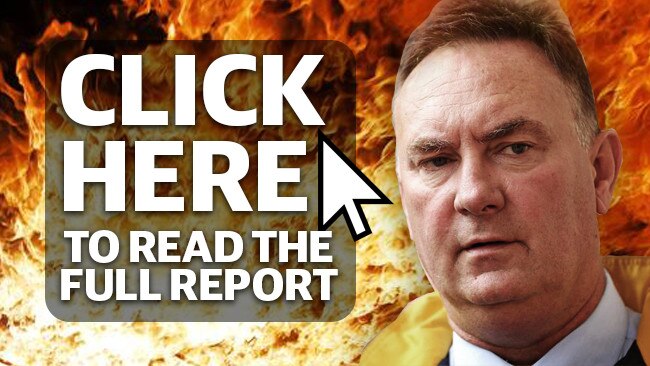MFB mental health review findings: Bullying, sexism, drug issues linked to mental health
IT’S the report the UFU wants to keep private. But the Herald Sun is publishing the landmark mental health review. It comes as the Deputy Premier defended the union’s bid to block its release. SEE REPORT HERE
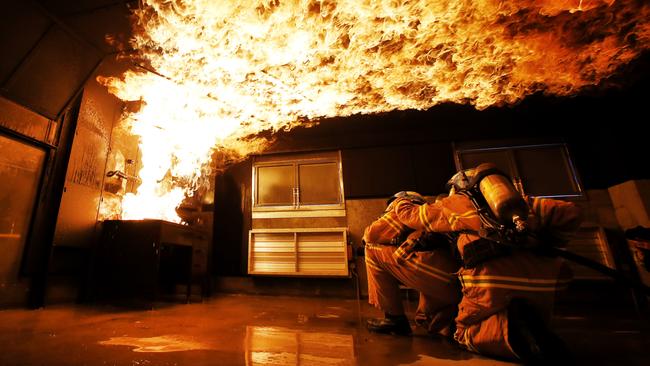
VIC News
Don't miss out on the headlines from VIC News. Followed categories will be added to My News.
- MFB mental health review reveals issues that can’t be ignored
- Block on mental health review may affect staff
- Bullying tops list of firefighter claims
DEPUTY Premier James Merlino has defended the United Firefighters Union as it continues to block the release of an independent review of mental health issues in the MFB.
The union is fighting at the Fair Work Commission this morning to stop the publication of the landmark report, which was obtained by the Herald Sun and shows bullying, sexism and harassment are rife within the brigade, causing widespread mental health problems among
firefighters.
Mr Merlino said it was “inappropriate” for him to comment on the matter because it was before Fair Work, as he refused to support the MFB’s push to release the independent review which was commissioned after three tragic suicides.
He said the UFU was “serious” about mental health.
“The support that our firefighters need is front and centre of the union’s mind,” Mr Merlino said.
Mr Merlino would not comment on concerns expressed by the review’s author, clinical psychologist Dr Peter Cotton, that the union’s refusal to release the report would harm the mental health of “vulnerable” firefighters.
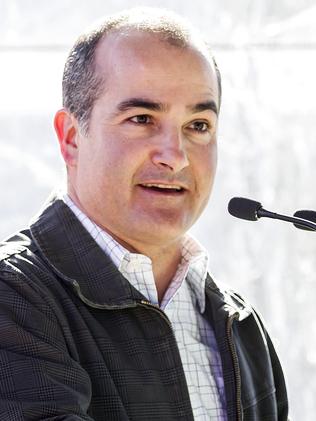
It comes as UFU secretary Peter Marshall renewed his attack on the MFB, accusing them of vilifying firefighters and using them as “political pawns”.
Mr Marshall said this morning that “the UFU never sought to block the release of the report” — even though the MFB was stopped from sharing it publicly on Monday because the union lodged a dispute in the Fair Work Commission.
Mr Merlino said mental health was a “serious issue” in the fire services, linked to the decades-long industrial battle. But he avoided questions about whether mental health itself should be an industrial issue.
Mr Merlino said there was a “a complete lack of trust” between the MFB’s management team and its workforce and that “everyone involved in our fire services … needs to look in the mirror”.
Before today’s Fair Work hearing, Mr Marshall said the report was being “used as a weapon” against firefighters, even though it sets out broad recommendations to improve their mental health.
“The report is bias, it’s been written with a political objective in mind, it’s been leaked to cause maximum vilification of firefighters,” Mr Marshall said.
“We call on the MFB to stop this politically motivated attack and put the welfare of firefighters first.
“The use of tragedies like firefighter suicides to promote a political agenda is shameful, and
risks the welfare of other firefighters managing health issues.
“That is why the UFU did everything we could to keep this Report out of the
public domain.”
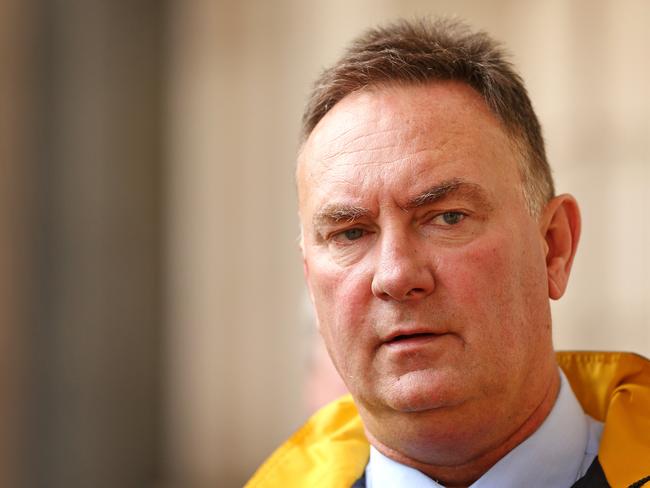
THE REPORT
The Herald Sun has obtained the 59-page report, despite the United Firefighters Union launching legal action to try to keep it suppressed.
The landmark mental health review paints an ugly picture of the state’s fire services where women are harassed, significant problems are covered up and firefighters believe they won’t be sacked no matter how poorly they behave.
The UFU blocked the MFB releasing the review on Monday, and will fight to suppress it in the Fair Work Commission today.
But the Herald Sun has obtained a copy of the report after it was briefly placed on the MFB’s intranet.
It reveals:
ALCOHOL and drug testing is needed to combat substance abuse as an “untold” number of firefighters “drink far too much”;
THE MFB’s WorkCover bill is $14.2 million, or $6455 per employee, more than double what Victoria Police spends;
FIREFIGHTERS are covering up for their colleagues, including some who are responding to emergencies even though they are “allegedly unable to bend over and tie up their shoelaces”;
SLEEP deprivation caused by fulltime firefighters working secondary casual jobs has a similar effect on their faculties as drinking;
SUPPORT systems are under-resourced but do meet best practice standards. Firefighters are in denial about seeking help for mental health problems;
SOME firefighters are “ambivalent” or even “actively negative” towards emergency medical response jobs; and
THERE is an “extreme lack of workforce diversity” — less than 4 per cent of firefighters are women — and sexism and harassment is common.
The report said bitter industrial stoushes had sapped morale in the MFB, which was linked to “a risk for increased negative responses to operational instances”, potentially putting safety at risk.
Clinical psychologist Dr Peter Cotton, who completed a similar report for Victoria Police, led the review in the wake of three suicides in two months.
His recommendations include fitness for duty assessments, increased mental health training and education, “psychological post mortems” after suicides to identify risk factors, and accelerated plans to increase diversity and flexible working hours.
Dr Cotton’s report criticised the UFU for its “attempts to undermine” a similar review by the Victorian Equal Opportunity and Human Rights Commission.
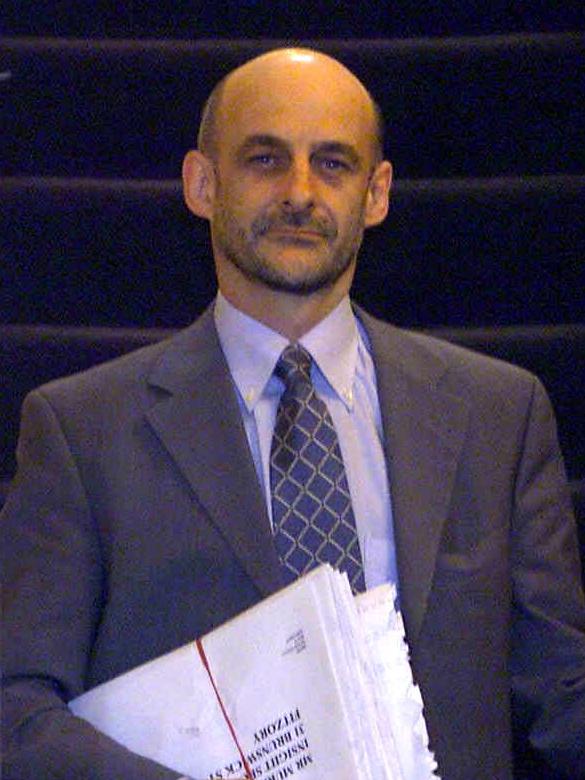
He said it was “imperative” mental health issues were “quarantined from being drawn into industrial relations or politicised agendas”.
MFB chief executive Jim Higgins, in a foreword to the report, said the MFB needed to change “no matter how challenging it may be at a cultural, organisational or personal level”. The Herald Sun understands the MFB has already responded to the review by hiring a new psychologist and peer support co-ordinator, and starting work on an IT framework to support its mental health processes.
The UFU said it was not consulted but Mr Higgins told staff a focus group was held at the union’s headquarters in June, and they were given the draft report more than three months ago.
Dr Cotton said it was “disgraceful” and “gobsmacking” that the UFU was trying to block the report’s release.
THIS IS WHY THEY NEED SOME HELP
THE Metropolitan Fire Brigade is plagued by bullying, harassment, substance abuse, sexism and tribal infighting.
It has left the mental health of firefighters in a precarious state, but the United Firefighters Union doesn’t want you to see this report on the crisis — and its recommendations for helping firefighters get better.
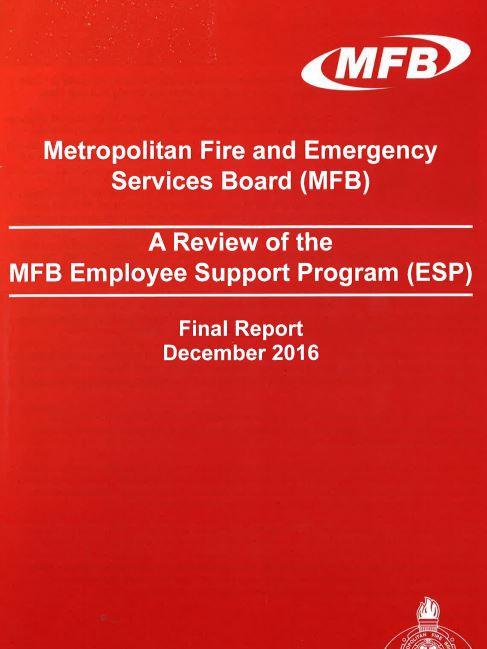
KEY FINDINGS
■ Mental health stigma stops firefighters seeking help.
■ Fire stations have “tribal subcultures”, which are supportive but not inclusive.
■“Extreme lack of workforce diversity” is contributing to mental health problems.
■ Bullying, harassment and inappropriate behaviour is tolerated.
■ Bitter industrial battles have sapped morale, which increases risk for emergency responses.
■ Suicide risk is of “significant concern” after three deaths in two months.
■ Anxiety, depression and work stress are major issues, as well as post traumatic stress.
■ Sleep deprivation is a problem for fulltime firefighters who have secondary casual jobs.
■ Misuse of alcohol and drugs is an “unexplored area of organisational risk”.
■ External clinicians helped 164 MFB staff in the first six months of this year.
■ Older demographic of firefighters is contributing to the mental health stigma.
■ Mental health first aid training is only delivered to 400 staff.
■ Firefighters have to initiate contact to get mental health help, rather than receiving proactive support.
■ Some firefighters have “ambivalent” or “actively negative” attitudes to emergency medical response jobs.
■ MFB is spending $14.2 million on WorkCover claims — $6455 per employee — more than double Victoria Police’s bill per person.
■ All women interviewed except one reported harassment, sexism and misogyny.
■ Non-Anglo Celtic males are “marginalised and bullied”.
■ Some firefighters attend emergencies when they allegedly “can’t even bend over to tie their shoelaces”.
■ Firefighters experiencing a “milder version of the Vietnam veteran experience” as they are vilified by the public.
■ Senior managers feel burnt out and can’t handle expectations.
■ Mental health has to be quarantined from industrial and political battles.
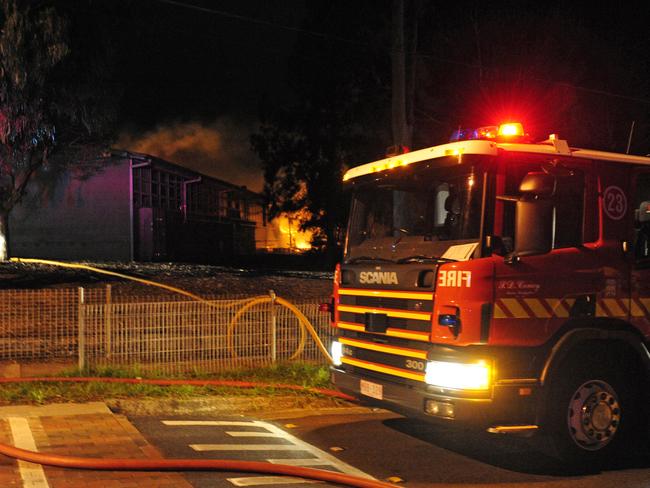
KEY RECOMMENDATIONS
■ Fitness for duty assessments.
■ Drug and alcohol screening, including random testing.
■ New clinicians to provide mental health screening, training and education.
■ Complete “psychological post mortems” after suicides to identify common risk factors.
■ Develop organisation-wide mental health literacy strategy with improved education.
■ Collect data on prevalence of mental health and substance abuse problems.
■ Mental health first aid and suicide awareness training.
■ Select senior “champions” to support lead mental health processes.
■ Accelerate plans to increase diversity and provide flexible working hours.
■ MFB and United Firefighters Union must “work together collaboratively” on mental health.
■ Fully support Victorian Equal Opportunity and Human Rights Commission review of the fire services.
■ Formalised resilience training, expanded wellbeing checks and “career break” opportunities.
CASE STUDIES
Firefighter: “You basically learn in induction that you can never be sacked, no matter what happens.”
Clinician: “There are an untold number of fireys who are on their second, third or fourth marriage, who drink far too much and have never realised that all the trauma they have seen has played a huge part in how those issues came about in the first place.’
Corporate staffer: “Two people in my area were bullied by a uniformed manager over quite a long time. He was always really controlling. They made complaints and other staff backed them up. The only response was to ‘just put up with it, it’s his personality’.”
Firefighter: “I support other people so I shouldn’t need to support myself.”
Senior firefighter: “I didn’t like the ... counsellor and they didn’t help me so I haven’t bothered to see anyone else — I just put that stuff away somewhere and I avoid certain situations. That’s how I cope.”
Male firefighter: “In every break the group conversation always turned to sex and smut. It used to stress me out.”
Female staffer: “The sexism is pervasive.”
Female staffer: “The prevailing view out there is they are changing everything to make it easy for women to get in ... this causes resentment.”
Female firefighter: “After I’d finished my course (promotional training), I was assigned to a new station. At muster, everyone gathered in the yard and then refused to shake my hand when I tried to introduce myself.”
Medical adviser: “They come in beating themselves up because they are not coping — there is an accumulation of stress responses.”
Twitter: @tminear


